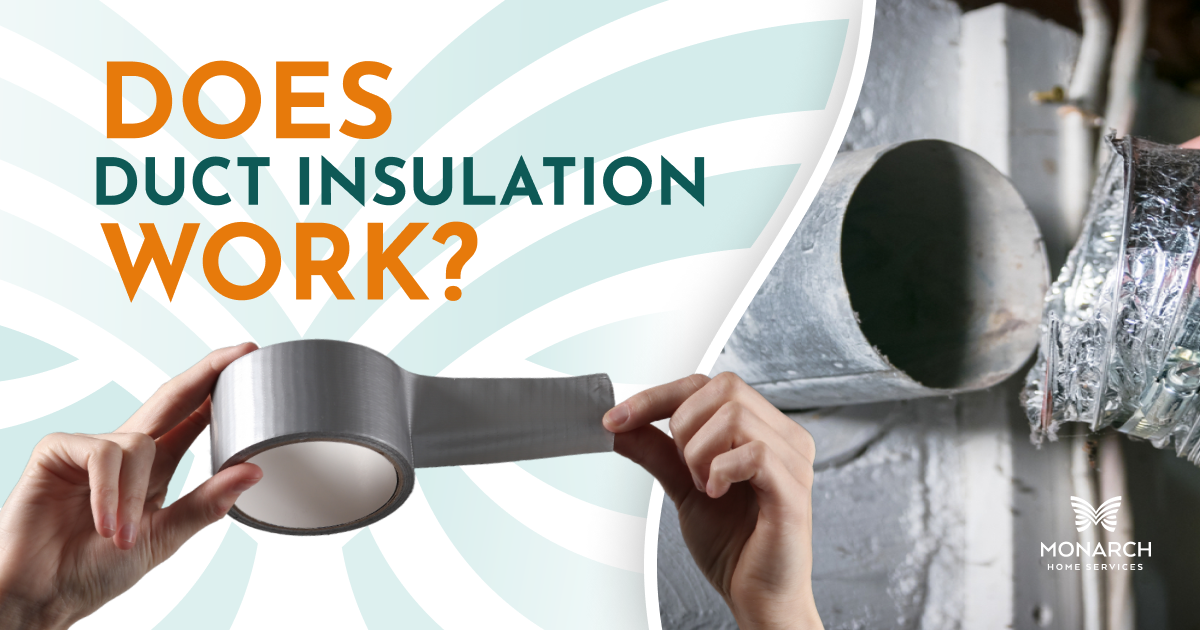
Our customers in Bakersfield, Fresno, and surrounding areas sometimes ask if ductwork insulation works. Like many homeowners, you may not think of your HVAC ducts often. After all, they’re mostly hidden behind walls and above ceilings. And, ductwork in basements, attics, and crawlspaces is rarely seen.
Nevertheless, the energy loss from uninsulated ductwork can have very noticeable effects. These range from reduced comfort to higher utility bills to increased strain and wear on your HVAC system that can lead to costly repairs. Just as duct sealing can improve indoor air quality, ductwork insulation has a few benefits.
The Implications of Ductwork Insulation
Two primary factors contribute to ductwork inefficiencies. One is airflow restrictions. If there’s a blockage or damage to a duct, your heating and cooling system will work harder to reach and maintain the desired temperature. Thermal losses are also problematic. If air ducts aren’t properly insulated:
- Warmth from heated air can escape through the duct walls, or,
- Cooled air can be heated within ducts located in hot environments
Both processes force your HVAC system to run longer to provide air that’s the right temperature.
Ductwork Insulation Can Help in Many Ways
Duct insulation works by preventing the transfer of heat in and out of air ducts. This has several implications regarding your HVAC system. Some of the advantages of insulating ducts include:
- Reduced HVAC Equipment Workload: Insulating your ductwork enables your HVAC unit to maintain your desired temperature at home for longer. Therefore, the system can run less frequently without compromising comfort. This can reduce wear and tear and save on repairs.
- Improved Comfort: In insulated ducts, air temperature is more effectively maintained. The warm or cool air produced by your HVAC unit can reach every part of your home, even on days with extreme temperatures. This means each room will be comfortable.
- Lower Energy Bills: Just by adding ductwork insulation, you can save hundreds of dollars per year. Insulation can last a long time so the long-term energy savings is significant. The amount you save varies depending on ductwork design and the type of HVAC system.
- Improved Indoor Air Quality: Insulated ducts are less likely to have moisture and condensation issues that can lead to mold. They can also avoid water damage to materials near air ducts. Ductwork that’s insulated has less air leakage as well, so your air filter will work more effectively.
- Reduced Noise: Sounds can travel through your HVAC ductwork and be heard from air vents. These noises can originate from your HVAC unit, inside ducts, or other rooms. Insulation can dampen noise so you can watch TV, have a conversation, and sleep or work undistracted even while the AC or heater is running.
Installing duct insulation also allows an HVAC contractor the opportunity to seal air leaks. Air leakage can dramatically reduce efficiency. Whether air is escaping from a small hole, a tear, or a leaky joint, a technician can use the latest non-invasive methods to quickly seal it and restore the performance and efficiency of your HVAC system.
How Do I Insulate the Ductwork in My Basement, Attic, or Crawlspace?
Insulating ductwork is a complex job. Making it a DIY project can result in ineffective insulation or duct leaks. Therefore, ductwork insulation should only be installed by a trained professional. When you hire a licensed technician to install it, you’ll know your air ducts will be properly sealed and insulated. You’re practically guaranteed to enjoy improved comfort and energy savings.
Ductwork insulation is often made of fiberglass, cellulose, or spray foam. Fiberglass duct wrap is a commonly used insulating material. Wrapping ducts in insulation isn’t as simple as it sounds. You also have to consider the insulating value of a particular material, whether you need rigid or flexible insulation, and if it’s the right size and thickness. Trained professionals know all the variables to consider and can determine the best insulation for your home and specific types of air ducts.
Are There Any Downsides to Ductwork Insulation?
Condensation may occur on insulation for cooling ducts. To prevent this, an HVAC contractor can install a well-sealed vapor barrier. Also, insulating basement ducts can make the space colder, which can be avoided by insulating both the ducts and basement walls. A professional may install electric heating tape on pipes to prevent them from freezing, which can occur in cold weather when heat ducts are fully insulated. These considerations reinforce the need for a trained air duct professional to insulate your ductwork.
Schedule Professional Ductwork Insulation with Monarch Home Services
At Monarch Home Services, we specialize in ductwork insulation, duct sealing, and other services that ensure your HVAC system works efficiently. Poorly sealed and uninsulated ducts reduce AC or heater performance no matter how energy-efficient your HVAC unit is. Our NATE- and EPA-certified technicians can determine what ductwork improvements you need and take steps to improve airflow and reduce heat loss. Call (661) 215-6745 today for a consultation and a free quote.

